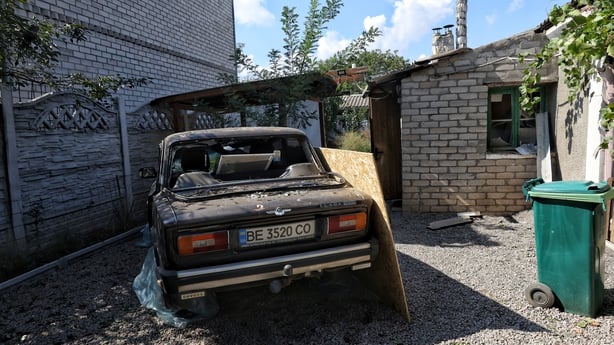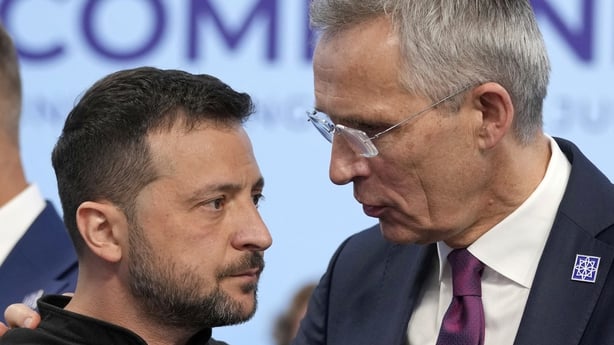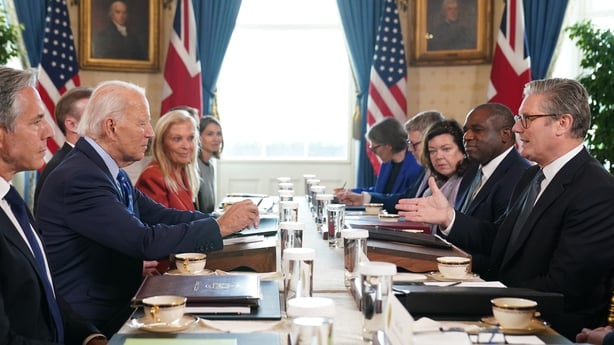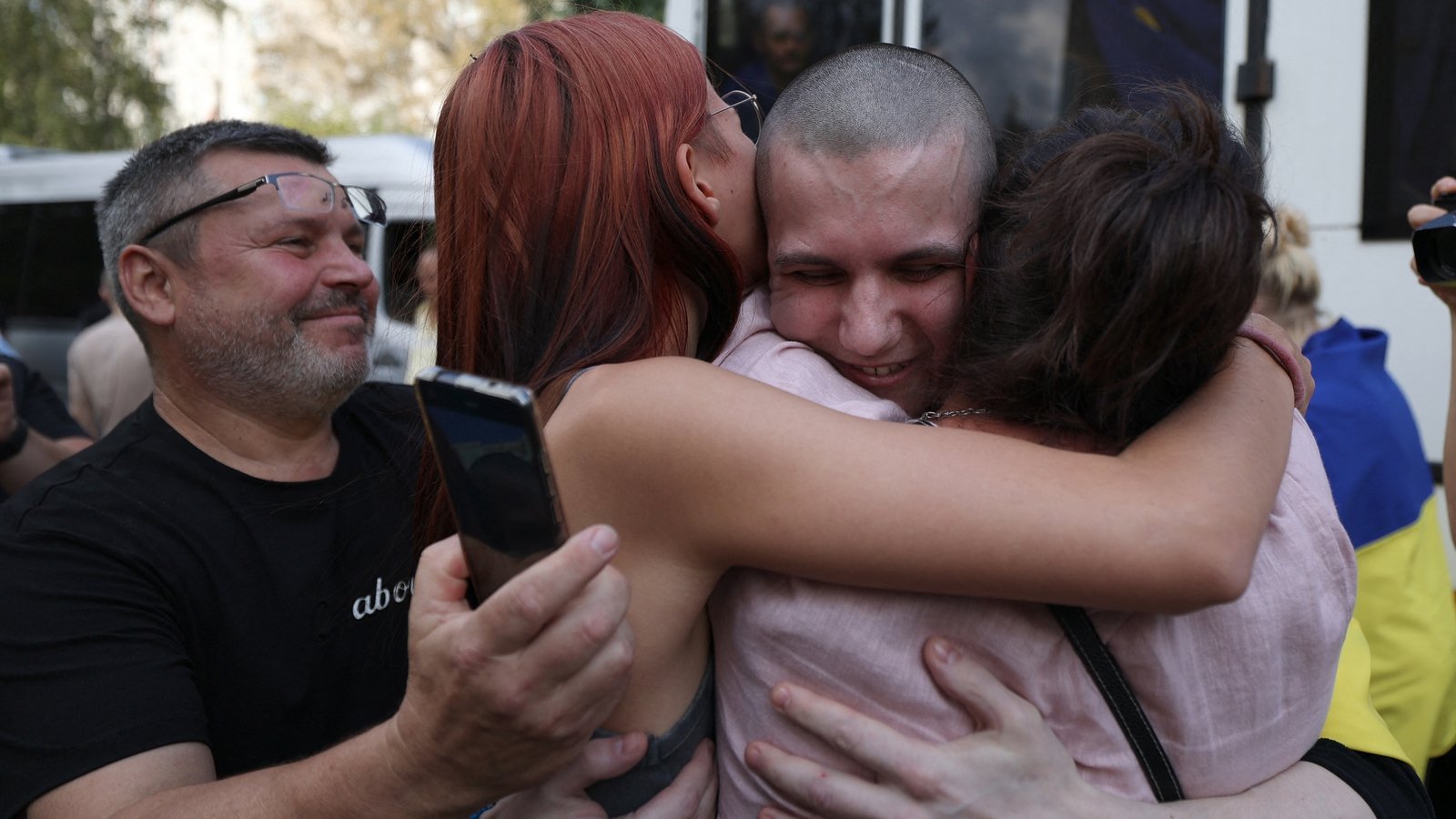Russia and Ukraine have conducted a major exchange of prisoners, 206 in all, in their second such swap in two days, following negotiations mediated by the United Arab Emirates, officials said.
President Volodymyr Zelensky said that all 103 Ukrainians returned were from the military, including 82 soldiers and privates alongside 21 officers.
The Russian Defence Ministry said that the 103 Russian soldiers exchanged had been taken prisoner in the border Kursk region where Ukrainian forces launched a surprise incursion in August.
“Our people are home,” Mr Zelensky said on the Telegram messaging app.
“We have successfully brought back another 103 warriors from Russian captivity to Ukraine,” he added.
Mr Zelensky posted pictures of servicemen wrapped in the national blue and yellow flag, hugging each other, talking on mobile phones and posing for group photographs at an undisclosed location.
The exchange was mediated by the UAE, Emirati state news agency WAM said.
It was the country’s eighth such mediation since the start of 2024, it said.
Kyiv and Moscow have frequently exchanged prisoners since Russia’s invasion in February 2022 and this swap was the third since Ukraine began a cross-border incursion into Russia’s Kursk region in early August.
Ukrainian officials have previously said its troops had captured at least 600 Russian soldiers during the incursion and that this would help it secure the return of captured Ukrainians.
Dmytro Lubinets, Ukraine’s ombudsman, said the majority of the freed Ukrainians had been in Russian captivity since the early days of the invasion.
He posted a short video on the Telegram messaging app showing the servicemen standing in front of a bus and shouting “glory to Ukraine”.
Mr Lubinets said that Kyiv had so far secured the return of 3,672 Ukrainians in 57 exchanges.
‘Giant melted spot’
Meanwhile, senior Russian security official and former president Dmitry Medvedev said Russia could destroy Ukraine’s capital Kyiv with non-nuclear weapons in response to the use of Western long-range missiles by Ukraine.
Mr Medvedev said Moscow already had formal grounds to use nuclear weapons since Ukraine’s incursion into Russia’s Kursk region, but could instead use some of its new weapon technologies to reduce Kyiv to “a giant melted spot” when its patience runs out.

Russia launched an overnight drone attack on Kyiv and other Ukrainian cities, prompting Mr Zelensky to issue a fresh appeal for more air defence and long-range capabilities.
Ukrainian air defences shot down 72 out of 76 Shahed drones over 12 regions in the centre, south and east of the country, the air force said.
“We need more capabilities to strengthen the air shield, air defence, and long-range capabilities to continue protecting life and our people,” Mr Zelensky said on the Telegram messaging app.
There were no immediate reports of casualties but authorities described damage to buildings in several parts of the country.
During nearly 31 months of the war, Moscow’s forces bombarded Ukraine with thousands of drones and missiles, killing thousands of civilians, damaging the country’s infrastructure and power sector and wrecking tens of thousands of residential and commercial buildings.
Moscow denies intentionally targeting civilians and says its long-range attacks aim to reduce Ukraine’s ability to fight.
Stoltenberg says NATO could have done more to prevent war
It comes as NATO Secretary General Jens Stoltenberg said that the organisation could have done more to arm Ukraine to try to prevent Russia’s invasion in 2022.
“Now we provide military stuff to a war – then we could have provided military stuff to prevent the war,” the outgoing head of the Western military alliance told German weekly newspaper FAS.
Mr Stoltenberg pointed to the North Atlantic Treaty Organisation’s reluctance to provide weapons that Kyiv had asked for before Russia’s full-scale invasion because of fears that tensions with Russia would escalate.

After the war began, Kyiv, which is not a member of NATO, received one weapons system after another from its allies after initial hesitation.
Mr Stoltenberg, a former prime minister of Norway, will step down in October from his role at NATO, which he has held since 2014.
Dutch former Prime Minister Mark Rutte was announced in June as the organisation’s next boss.
In the interview, Mr Stoltenberg said an end to the war in Ukraine would be achieved only at the negotiating table.
“To end this war there will have to be again dialogue with Russia at a certain stage. But it has to be based on Ukrainian strength,” he said.
Biden, Starmer put off Ukraine missiles decision

Meanwhile, British Prime Minister Keir Starmer and US President Joe Biden have delayed a decision to let Ukraine fire long-range Western-supplied missiles into Russia, a plan that sparked dire threats from Moscow of a war with NATO.
Mr Starmer told reporters at the White House yesterday that he had a “wide-ranging discussion about strategy” with Mr Biden but that it “wasn’t a meeting about a particular capability”.
Before the meeting officials had said Mr Starmer would press Mr Biden to back his plan to send British Storm Shadow missiles to Ukraine to hit deeper inside Russia as allies become increasingly concerned about the battlefield situation.
But the Labour leader indicated that he and Mr Biden would now discuss the plan at the UN General Assembly in New York the week after next “with a wider group of individuals”.
Mr Biden played down a warning by Russian President Vladimir Putin that allowing Ukraine to fire the weapons would mean the West was “at war” with Russia.
But while Mr Biden said it was “clear that Putin will not prevail in this war,” he is understood to be reluctant to grant Ukraine’s insistent demand to be able to use long-range US-made ATACMS missiles against Russian territory.
Mr Zelensky however pushed Kyiv’s Western allies to do more.
Speaking in Kyiv, Mr Zelensky accusing the West of being “afraid” to even help Ukraine shoot down incoming missiles as it has done with Israel.
Mr Zelensky added that he will meet Mr Biden “this month” to present his “victory plan” on how to end two and a half years of war with Russia.
Russia has reacted angrily to the prospect of the West supplying long-range weapons to the country it invaded in February 2022.
Elsewhere North Korean leader Kim Jong Un pledged to deepen ties with Russia as he held talks with visiting Russian security chief Sergei Shoigu, state media reported.
Western powers have accused cash-strapped North Korea of selling ammunition to Russia in defiance of sanctions over the more than 30-month war in Ukraine.
North Korea has recently bolstered military ties with Russia, with President Vladimir Putin making a rare visit to Pyongyang in June, where he signed a mutual defence agreement with Mr Kim.

